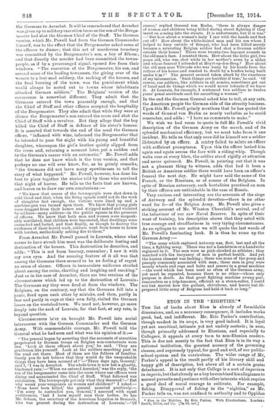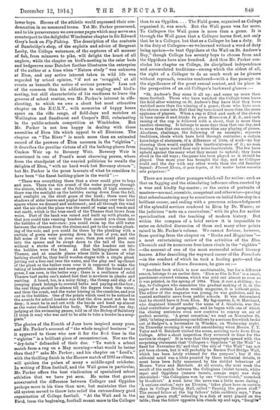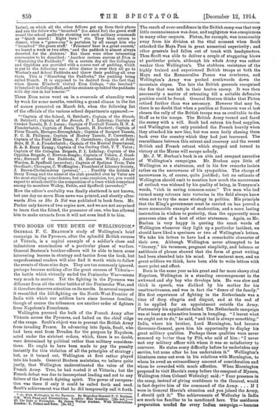ETON IN TEE "EIGHTIES."• THE list of books about Eton
is already of formidable dimensions, and, as a necessary consequence, it includes works good, bad, and indifferent. Mr. Eric Parker's contribution, though modest in its scope, is very good indeed. It is loyal yet not uncritical, intimate yet not unduly esoteric ; in sum, though primarily addressed to Etonians, and especially to Collegers, it appeals at every turn to non-Etonian readers. This is due not merely to the fact that Eton is in its way a national institution, the greatest nursery of the governing classes, and supremely typical, for good and evil, of our public. school system and its curriculum. The wider• range of Mr• Parker's appeal is the result partly of his literary skill and happy gift of description, but above all of a certain genial detachment. It is not only that College is a sort of imperium in imperio, but that already as a boy hecombined his allegiance to normal pursuits and pastimes with other interests which require a good deal of moral courage to cultivate. For• example, fishing. Disapproval of fishing in the "eighties," as Mr. Parker• tells us, was not confined to authority and to Oppidan • Eton in the 'Eightiea. By Eric Parker, With InnAmtions, London% Smith, Elder, and Co. Lls. 61. net.]
lower boys. Heroes of the athletic world expressed their con- demnation in no measured terms. Yet Mr. Parker persevered, and to his perseverance we owe some pages which may serve as a counterpart to the delightful Winchester chapter in Sir Edward Grey's book on Fly-Fishing. The description of the contents of Bambridge's shop, of the exploits and advice of Sergeant Leahy, the College waterman, of the captures of all manner of fish, from minnows to pike, will delight the heart of all anglers; while the chapter on bird's-nesting in the osier beds and hedgerows near Datchet further illustrates the enterprise of the author at a time when "Nature study" was unknown
at Eton, and any active interest taken in wild life was regarded by school opinion, " if not as `scuggish,' at all
events as beneath the notice of serious persons." Less out of the common than his addiction to angling and bird's- nesting, but still characteristic of his readiness to leave the grooves of school routine, was Mr. Parker's interest in rifle- shooting, to which we owe a short but most attractive chapter on the E.C.R.V., with memories of happy hours spent on the rifle range, of field-days and matches at Wellington and Sandhurst and Cooper's Hill, culminating in the public-schools competition at Wimbledon. But Mr. Parker is not less happy in dealing with those amenities of Eton life which appeal to all Etonians. The chapter on "The River" is much more than an animated record of the prowess of Eton oarsmen in the "eighties "; it describes the peculiar virtues of all the bathing-places from Cuckoo Weir up to Boveney Weir. Boveney Weir is mentioned in one of Praed's most charming poems, where from the standpoint of the wearied politician he recalls the delights of Eton, "with no hard work but Boveney stream"; but Mr. Parker is the prose laureate of what he considers to have been " the finest bathing-place in the world " :-
"There was everything there that a river could give to boys and men. There was the sound of the water pouring through the sluices, which is one of the fullest sounds of high summer; there was the sunlight on the bubbles racing down from the fall, and sunlight on the short grass of the bank ; there were the shadows of alder leaves and poplar leaves flickering over the level spaces where we dressed and undressed ; and all through the wind and the air about the place was the smell of water and weeds and wet earth, which is the true smell of the Thames that blows from weirs. Part of the bank was raised and built up with planks, so that you could take running headers that carried you clean into the bubbles of the weir-race : you could swim up the still water between the streams from the sluices and get to the wooden plank- ing of the weir, and you could lie there by the planking with a curtain of green water pouring down in front of you, and the full noise of the weir in your ears ; then you could push out into the spume and be swept down to the tail of the race without a stroke of swimming. But the headers out into the bubbles were the best. At other bathing-places on the Thames, and at seaside places where little is known of what bathing should be, they build wooden stages with a single plank jutting out a free end over the water, and the play and up-thrust of the plank as the bather runs over it is supposed to make the taking of headers easier and more graceful. But the broad run of grass, I am sure, is the better way ; there is a resilience of solid Thames turf under one's naked feet that is nowhere in planks and matting. A board, too, is a noisy thing ; the thump and slap of a jumping plank belongs to covered baths and paying-at-the-box ; the real thing should be silence till the fingers touch the water, and then the crash, and the water hissing in the sunshine, and you out in the bubbles. One of the points which used to be noticed in the awards for school headers was that the dive must not be too deep ; it must be in and out with the hands and head up almost as the water closed behind the body. Walter Durnford one day, judging at the swimming games, told us of the Bishop of Salisbury (I think it was) who was said to be able to take a header in a soup- plate."
The glories of the Fourth of June have inspired many pens, and Mr. Parker's account of "the whole magical business " as it appeared to those who saw it for the first time in the " eighties " is a brilliant piece of reconstruction. Nor are the " dry-bobs" defrauded of their due. " To watch a school snatch from a rug on a May morning—what would be better than that ? " asks Mr. Parker ; and his chapter on " Lord's," with the thrilling finish in the Harrow match of 1885 as climax, will quicken the pulses of many a middle-aged cricketer. In writing of Eton football, and the Wall game in particular, Mr. Parker offers the best vindication of specialized school athletics that we have yet seen. He notes that games accentuated the difference between Colleger and Oppidan
perhaps more in his time than now, but maintains that the old system served to throw into relief the extraordinary good
organization of College football. "At the Wall and in the Field. from the beginning, football meant more to the Colleger than to an Oppidan.... The Field game, organised as College organised it, was much. But the Wall game was far more.
To Collegers the Wall game is more than a game. It is through the Wall game that a Colleger learns first, not only that he is a Colleger, but that as a Colleger he has a duty. It is the duty of Collegers—so we learned without a word of duty being spoken—to beat Oppidans at the Wall on St. Andrew's Day," though College has seventy boys to choose from and the Oppidans have nine hundred. And thus Mr. Parker con- cludes his chapter on College, its disciplined independence and accumulated traditions—among which the oldest of all, the right of a Colleger to do as much work as be pleases without reproach, remains unaltered—with a fine passage on the significance of the great annual contest, and its place in the perspective of an old Colleger's backward glances :- "St. Andrew's Day sums it all up : and sums up more than mere football. Those who have watched the College team leave the field after winning on St. Andrew's Day know that they have watched more than the winning of a game ; those who have seen the eleven come into Hall that day have heard more than the mere applause of players. When a cup is filled and each of the eleven in turn raises it and drinks In piam Memoriam J. K. S., and each raising of the cup is followed with a shout, that is more than careless cheering. It belongs to more days than that one day, and to more than that one match ; to more than any playing of games. Aloofness, challenge, the following of an example ; separate traditions, ideals which have held through centuries ; a certain knowledge of sternness, of a difference of lives, of work—no boy cheering then would explain the inarticulateness of it ; no man hearing it again would hear only noise inarticulate. The few have upheld against the many what they meant to uphold ; they have stood in the old ways ; the game has been played as it should be played. One more year has brought the day, and no Colleger could end the day with any other words than the old familiar legend: Floreat Etona, et gens togata, et hic nester /mho muralis seta perpetuus "
There are many other passages which call for notice : such as that on fagging and the stimulating influence often exerted by a wise and kindly fag-master ; or the series of portraits of masters—normal, eccentric, competent and otherwise—proving that schoolmastering may be sometimes an initial false step in a brilliant career, and ending with a generous acknowledgment of the splendid services rendered to Eton by Dr. Warre; or the judicious "note on a curriculum," with its plea for earlier specialization and the teaching of modern history. But within the compass of a brief review it is impossible to enter on detailed discussion of these and many other points raised in Mr. Parker's volume. We cannot forbear, however, from quoting from the chapter on "Books and Magazines "- a most entertaining review of the activities of the Elms Chronicle and its numerous free-lance rivals in the " eighties " —the account of one of the most successful school literary hoaxes. After describing the wayward career of the Parachute —in the conduct of which he took a leading part—and the tragi-comic fate of Seven Summers, he goes on :—
" Another book which is now unobtainable, but for a different reason, belongs to an earlier date. Eton as She Is Not' is a small, parchment-covered volume, which was sold out almost as soon as it was printed, in the spring of 1884. Then it cost a shilling ; to- day, to Collegers who remember the gradual making of it, in the pages of a certain London weekly magazine, it is without price. The editor of the magazine was young, he was guileless, and he wanted authentic news from public schools. It was determined that he should have it from Eton. My fag-master, L. G. Hatchard, who disguised himself under the name of J. Goodwin, was the chief contributor of paragraphs ; and be began with one of which the closing sentences even now contrive to convey an air of perfect security. ' A great sensation,' we read on November 28, 1883,' is being caused among our fellows by a serious fire which broke out at Badger's, a bootmaker in Windsor, on Wednesday night. On Thursday morning it was still smouldering when Messrs. 2'. T. Vator and G. Batchett visited the scene, arriving early from Eton College. After a short inspection they returned in time for the service in chapel. It is true that this paragraph opened with the surprising statement that 'Collegers v. Oppidans " at the Wall" is fixed for November 30,' and that 'the site of "the Wall " has not yet been chosen, but it will probably be Barnes Pool Bridge Wall, which has been lately widened for the purpose ' ; but if the editorial mind was a little puzzled by these technical details, it must have been fully reassured by the dutiful behaviour of Messrs. Vator and Batchett. At all events, the next week the result of the match between the Collegians (violet tassels, white caps) and Oppidans (mauve tassels, orange caps) was duly chronicled : the Collegians won by one " throw-touch," scouched by Goodh‘rt.' A week later the news was a little more daring : 'A curious custom,' says an Etonian, takes place here on certain days in College Dining Hall, called " Passing the green stuff." The second fellow at the big fellows' table suddenly says, " Pass me that green stuff," referring to a dish of mint placed on the table; then the fellow opposite him stands up and says, "Surgite" (arise), on which all the other fellows get up from their places and run the fellow who "broached" (i.e. asked for) the green stuff round the school paddocks shouting out such military command's as " Quick march ! Right turn " etc. They then return to dinner, when a "grace-cup" is partaken by all except him who "broached" the green stuff.' ' PriSoners' base is a great success,' we learnt a week or twd after, and the paddock is almost always deserted for the cloisters.' But there were other interesting ceremonies to be described : Another curious custom at Eton is " Slunching the Paddocks." On a certain day all the Collegians and Oppidans are provided with a coarse sort of pudding, which is put to the following use: After dinner is over they all go to Weston's and School Paddocks and throw their pudding all over them. This is " Slunching the Paddocks," the pudding being called Slunch. It is supposed to be derived from the fact that when Queen Elizabeth visited Eton College, "she lunched" (slunched) in College Hall, and the students sprinkled the paddocks with dry rice in her honour.'" These Eton notes went on in a crescendo of absurdity week by week for some months, reaching a grand climax in the list of names presented on March 5th, when the following list of the officials of the various school departments appeared :— "'Captain of the School, G. Patchett ; Captain of the Siena, G. Patchett; Captain of the Broach, P. I. Lazing; Captain of Cricket Tassels, R. J. Lucas ; Captain of Football Tassels, H. N. A. Flenderbatch; Captain of Boats Tassels, H. Duckett; Captain of Fives Tassels, Havager-Boroughdale ; Captain of Racquet Tassels, P. C. H. Philipson ; Captain of Hockey Tassels, P. Carruthers; Captain of the Field Mice Team, P. Carruthers ; Captain of Jolly Boys, H. N. A. Flenderbatch; Captain of the Musical Department, R. A. S. Berry Young; Captain of the Curling Club, T. T. Vator; Captain of the Collegian Brigade, P. I. Mitring; Captain of the Oppidan Brigade, C. Newton-Beagle ; Captain of Ushers, J. Good- win ; Steward of the Paddocks, H. Beecham Wolley; Junior. Warden, B. Spnffnell (smut:due); Captain of Spelican Team, Tute Goodhart ; Choragus, C. Wallington ; President of Literary Society, J. Brown-Cholmondeley (primus): . . . Possibly the initials of Berry Young and the name of the club presided over by Vator are the most startling coincidences, but some suspicion, too, you would expect to attach itself to the composition of a team which Comprised among its members Wolley, Pattie, and Spuffnell (secundus)."
How the editor's credulity was finally shattered is not known, but one day no more Eton news was printed, and shortly after- wards Eton as She Is Not was published in book form. Mr. Parker only knows of two copies now, and we are not surprised to learn that the friend, the possessor of one, who has allowed him to make extracts from it will not even lend it to him.
















































 Previous page
Previous page